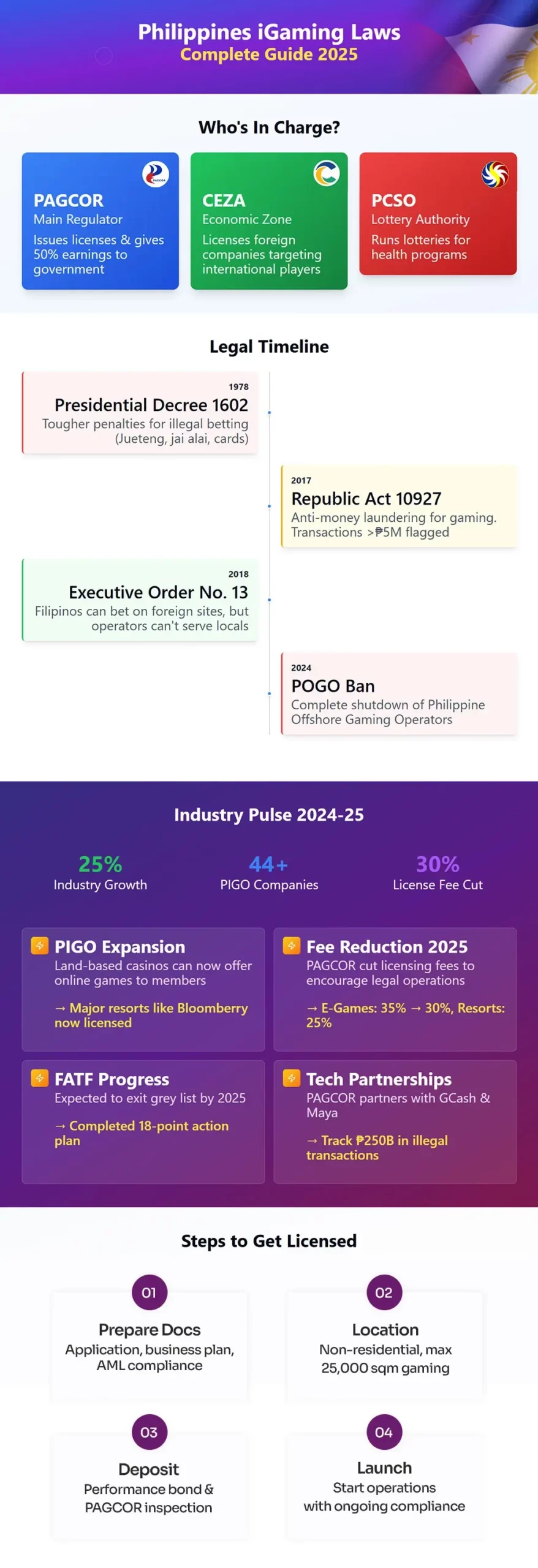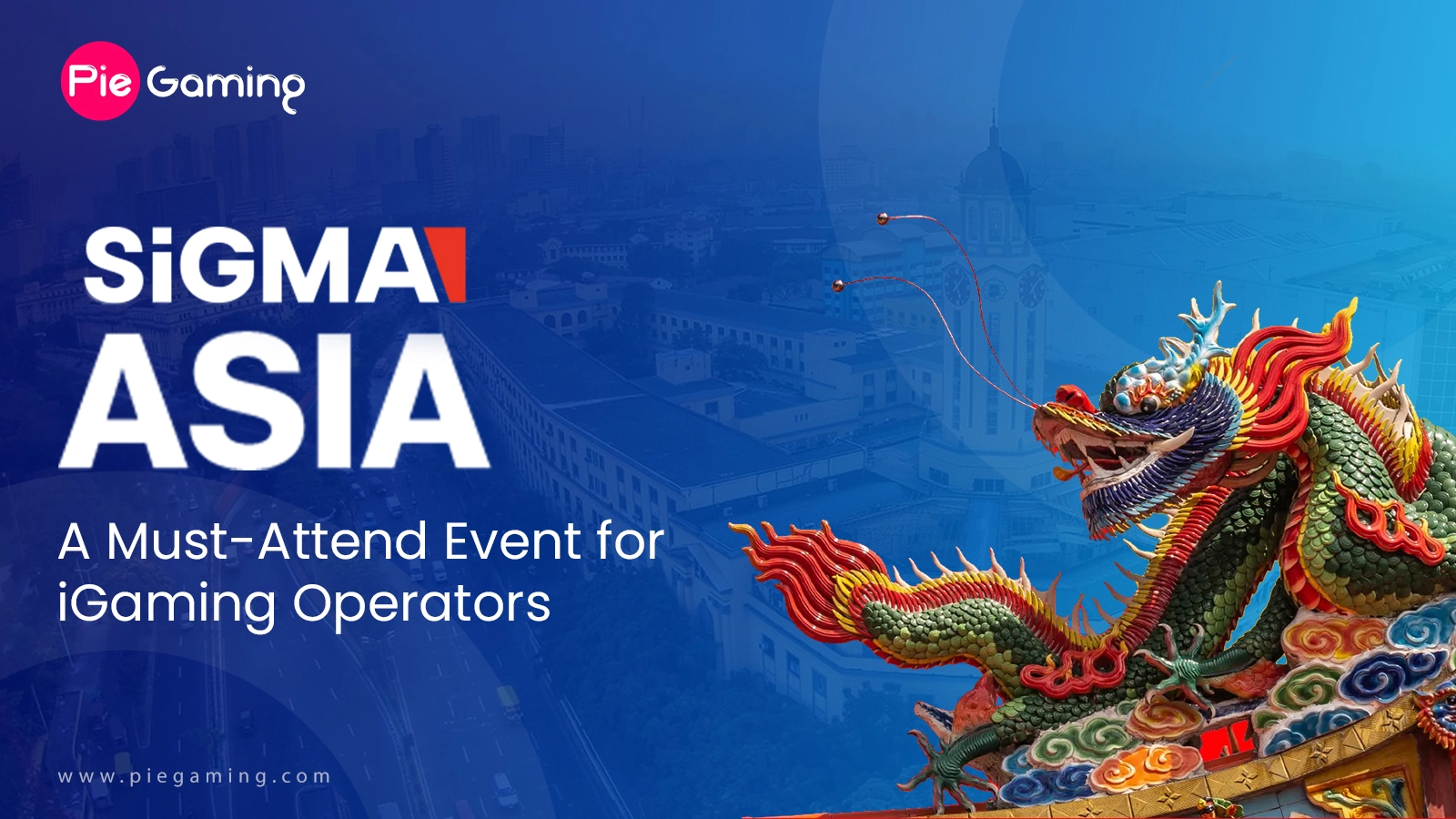Online Casino & Sports Betting Regulations in the Philippines | 2025
- Author:Palak Madan
- Read Time:10m
- Published:
- Last Update:

In 2025, online casino & sports betting are legal in the Philippines. Operators must follow new rules and get licenses from PAGCOR or POGO to run legally.
The rules of the game have changed for betting operators in the Philippines.
With the new online casino and sports betting regulations in the Philippines. The country is set to change the iGaming industry in 2025. So, your business decisions today will determine whether you are dealt a winning hand or forced to fold.
Local licenses now come with stricter conditions.
Offshore operators face increased scrutiny.
Tax rates have shifted and compliance requirements have multiplied, too.
Yet beneath these challenges lies a market still hungry for quality betting experiences.
Here’s all you need to know to get through one of Southeast Asia’s most vast betting markets.
Legal Framework of Online Gambling in the Philippines

Framework of Online Gambling in the Philippines
To understand iGaming in the Philippines, you need to know who regulates it, what sorts of betting are allowed, and which laws are applied. So, read on to find out about sports betting regulations in the Philippines and casino licensing.
Governing Bodies & Licensing Authorities
PAGCOR (Philippine Amusement and Gaming Corporation)
PAGCOR is a government-owned and controlled organization. It was established in 1977 under Presidential Decree No. 1067-A.
Its primary role is to regulate and operate games of chance, including casino gaming in the Philippines.
What PCGOR does:
- Issues licenses for casinos, electronic games, and iGaming.
- Gives at least 50% of its earnings to the govt. for public programs.
CEZA (Cagayan Economic Zone Authority)
CEZA was set up in 1995 to run the Cagayan Special Economic Zone. It can give out betting licenses without needing PAGCOR’s approval.
What CEZA does:
- Give licenses to foreign betting companies targeting international players.
- Attract businesses to the Cagayan Freeport Zone through tax benefits.
- Ensure betting operations follow international standards.
CEZA has become well-known in Asia for online sports betting regulation and aims to bring in more foreign investment.
Aurora Pacific Economic Zone and Freeport Authority (APECO)
APECO was created in 2007 to develop the economic zone in Casiguran, Aurora.
It aims to attract investors and create jobs.
What APECO does:
- Issues licenses for iGaming aimed at foreign players.
- Promotes various industries in the zone, including betting and tourism.
- Works with its main license holder to ensure operators follow the rules under the Philippines Casino Licensing 2025.
Authority of the Freeport Area of Bataan (AFAB)
AFAB was formed in 2009 to manage the Freeport Area of Bataan.
It works under the president’s office to revitalize the area through new investments.
What AFAB does:
- Offers incentives to attract businesses.
- Has the power to issue licenses for both physical and online wagering.
Philippine Charity Sweepstakes Office (PCSO)
The PCSO is a government agency that runs lotteries to raise money for health programs and medical help across the Philippines.
What PCSO does:
- Runs popular lottery games like Lotto 6/42, MegaLotto 6/45, and UltraLotto 6/58.
- Invests in health-related projects that don’t compete with private businesses.
Games and Amusement Board
GAB oversees professional sports in the Philippines.
Created in 1951, GAB makes sure sports are fair and fights against illegal betting on sports events.
What GAB does:
- Regulates professional sports like basketball, boxing, billiards, and eSports.
- Runs an anti-illegal betting unit to stop illegal betting on sports.
Current Laws & Acts Governing Online Gambling
Below is a clear breakdown of the major laws and online casino regulations currently in effect. Let’s have a look at the same.
1) PAGCOR Internet Gaming Licensing Regulations (IGLR)
The PAGCOR works as the primary regulatory body overseeing both land-based and iGaming activities in the country.
If you want to run an online betting business, you need to give PAGCOR detailed business plans and prove you follow AML laws.
You can’t set up your betting operation in residential areas where people live.
You will also need to pay a security deposit as a guarantee that you will follow the rules.
These regulations ensure iGaming companies operate legally and responsibly under the umbrella of online sports betting regulation.
2) Presidential Decree 1602 (1978)
This made penalties tougher for illegal betting like Jueteng, jai alai, and card games.
The punishment ranges from fines to imprisonment, depending on the offense and the person’s role.
Government officials who get caught face even bigger punishments.
3) Executive Order No. 13
This order creates an interesting situation for the Filipino players.
A Filipino can bet on foreign websites without breaking any laws.
However, operators cannot offer iGaming services to locals.
The rule protects Filipino players from potentially dangerous unregulated local betting platforms. While still giving them access to legal options abroad via licensed operators, following the sports betting laws in the Philippines.
It’s like saying you can shop at foreign stores, but local stores can’t sell certain products to you.
4) Republic Act No. 10927 (2017)
This law fights money laundering in the betting industry.
Before 2017, casinos were not required to report suspicious financial activities.
Now, all casinos– including online ones– must report large transactions to authorities.
Any transaction over ₱5 million (about $100,000) gets flagged and reported.
Betting operators must check their players’ identities and keep detailed records.
This helps prevent criminals from using betting to hide illegal money.
The law applies to all betting operators, including foreign companies that serve Filipino players.
5) POGO Ban Executive Order (November 2024)
In November 2024, President Ferdinand Marcos Jr. took strong action against Philippine Offshore Gaming Operators (POGOs).
These companies, which mainly served foreign bettors, had to shut down completely by December 31, 2024.
The government banned POGOs because they were linked to serious problems like increased crime rates, human trafficking, and violations of online casino regulations.
POGO’s ban was aimed at cleaning up the betting industry and addressing social problems connected to these operations.
6) Proposed Anti-POGO Act (Pending)
This proposed law would make the POGO ban permanent and close any loopholes.
It’s currently being considered by the lawmakers.
If passed, it would cover gaming companies licensed by any government agency, not just PAGCOR.
Lawmakers want to prevent POGOs from simply rebranding themselves to avoid the ban.
This act shows the government’s commitment to keeping certain types of betting operations out of the Philippines permanently.
7) House Bill 8910 (E-Sabong Regulation)
This bill solely focuses on regulating e-sabong, which is online cockfighting– a popular form of betting in the Philippines.
It establishes licensing requirements and standards for e-sabong operators.
The bill includes provisions to protect players from fraud and promote responsible betting practices.
The Games and Amusement Board (AMB) would have increased oversight over these platforms.
Current Industry Status
Despite these strict online casino and sports betting regulations in the Philippines and the POGO ban, the Philippine betting industry grew in 2024.
This growth came mainly from legal sectors like E-Games and E-Bingo.
To promote more legalized betting, PAGCOR reduced licensing fees for E-Games from 50-55% down to 30% starting in January 2025.
Additionally, Philippine authorities have been cracking down on illegal online betting and related cybercrime as part of enforcing online sports betting regulation.
In one major raid in Pasay City, Manila, they arrested over 400 people involved in illegal betting and scam operations.
Currently, Philippine players can legally bet on licensed foreign platforms but not on Filipino-owned websites.
Read More – How To Create Your Own Sports Betting Platform?
Key Regulatory Updates in the Philippines iGaming Industry (2025)
Philippines authorities have revamped online casino and sports betting regulations, focusing on security, taxation, and more. Let’s have a look at them.
1) Expansion of PIGO model
PACGOR introduced the PIGO model in late 2020 to help land-based gaming operators survive COVID-19 lockdowns.
This plan lets actual casinos offer online games to their members with special permits that require links to their physical buildings.
PIGOs have many games, including,
- Live dealer casinos
- Slot machines
- Sports betting
- E-bingo
But now the PIGO model is getting bigger.
By June 2024, more than 44 companies got permission to offer iGaming.
Big resort companies like Bloomberry and Travellers International are now part of this system.
This growth depicts that more betting is moving online in the Philippines, but in a way that follows the rules.
2) Licensing fee reduction
PAGCOR has lowered the fees that gaming companies need to pay for licenses. Starting January 1, 2025:
- Electronic game licenses dropped from 35% to 30%.
- Integrated resorts (large casino complexes) will pay even less, just 25%.
This is happening for two main reasons:
- To get illegal betting operations to become legal and licensed under the Philippines Online Casino Rules.
- To help current legal operators have more money for advertising and growing their businesses.
3) Financial Action Task Force (FATF)
The Philippines has been working hard to stop money laundering.
The country is now expected to get off the FATF’s “grey list” (a list of countries needing extra monitoring) by 2025.
The FATF (an international group that fights money laundering) has noticed big improvements in how the Philippines handles this problem.
Here’s what made this possible:
- The country completed an 18-point action plan to strengthen its laws.
- They now watch financial transactions more carefully in line with online sports betting regulation standards.
- They’ve created better standards that companies follow.
Getting off the grey list will improve the country’s financial reputation.
4) Partnerships with Financial Platforms
PAGCOR has partnered with GCash and Maya to track and stop illegal online betting transactions that cost the Philippines up to ₱250 billion yearly.
(Source: The Straits Times- Philippines grapples with online gambling boom – and doom)
These partnerships focus on player protection through transparent transactions and strict identity verification using government IDs, ensuring full compliance with online casino regulations.
Additionally, operators now use safer betting tools like ID checks and self-exclusion options for players.
At the same time, PAGCOR is asking big tech companies like Google and Apple to take down betting apps that aren’t legal.
How Can You Operate Legally In The Philippine iGaming Market?
To run a legal iGaming business in the Philippines, you need to get the right permits and follow the rules set by the government gambling authority. Here’s what all you need to know:
Types Of Licenses Available
1) Philippine Offshore Gaming Operator (POGO)
These licenses allow companies to offer betting services to players outside the Philippines.
However, as previously discussed, the government has announced a ban on POGOs.
2) Philippines Inland Gaming Operator (PIGO)
Introduced in 2018, this license allows companies to offer betting services within the Philippines, including sports betting and online gaming.
To qualify, you need:
- At least 100 million Philippine Pesos in the Capital.
- A minimum of 10 years of experience in the iGaming industry.
Application Process
1) Documents You’ll Need
- A letter telling PAGCOR you must apply.
- Completed application forms.
- Papers showing you’ve set up a local company with the right ownership and money.
- A business plan explaining what you will do while aligning it with online casino and sports betting regulations in the Philippines.
- An organizational chart showing your company structure.
- Proof that you follow anti-money laundering laws.
2) Location Requirements
- Your operation can’t be in a residential area where people live.
- There are size limits: 25,000 square meters for gaming operations and 10,000 square meters for support services.
- You need approval from the local government to legally offer services in line with online casino regulations.
- You must prove that you own and rent your business location.
3) Before You Can Start Operating
- You must put down a performance bond (like a security deposit).
- Allow PAGCOR officials to inspect your premises.
- Have an anti-money laundering program.
- Create a responsible betting program to help problem gamblers.
Tax Benefits and Ongoing Rules
If you get a PIGO license, you’ll pay lower taxes than regular businesses (10% corporate income tax instead of 20%).
Additionally, you will be exempt from certain additional taxes.
However, PAGCOR will keep a close eye on you through:
- Regular audits.
- Detailed Reports.
- Monitoring for suspicious activities as per online casino regulations.
Wrapping Up…
For gambling companies, the Philippines offers great opportunities in 2025. Securing a gaming license now takes just 90 days with one simple application. Companies pay less tax if they hire Filipinos and build facilities in the country.
The new “Operator Scorecard” helps companies know if they’re following the rules correctly. The government promises not to change the rules for at least three years, making business planning easier.
While some challenges still exist, the Philippines has created a friendly environment where iGaming businesses that follow the rules can succeed.
So, if you’re thinking about starting an online gambling business in the Philippines, it’s definitely a green flag for those following online casino and sports betting regulations in the Philippines.
FAQs
-
What Forms Of Gambling Are Legal In The Philippines?
Legal gambling in the Philippines includes licensed casinos, electronic games, horse racing, cockfighting, and lotteries run by the PCSO.
-
Is sports betting legal in the Philippines?
Yes, sports betting is legal when done through licensed operators. PAGCOR ensures these companies follow all the betting laws.
-
What Is The Penalty For Illegal Gambling In The Philippines?
People caught betting illegally can be fined, sent to jail, or have their businesses closed. Both individuals and companies can face criminal charges under Philippine laws.
-
Can government employees play online casinos in the Philippines?
No, government employees are not allowed to gamble online. This rule helps prevent conflicts of interest and keeps government workers acting ethically.

Palak Madan is a enthusiastic writer at PieGaming. With over 2+years of experience crafting engaging content and a strong literature background, Palak brings a unique perspective to the world of words. Her ability to blend creativity with strategic thinking has made her a sought-after content creator. She's eager to dive deep into the intricacies of iGaming software, uncovering the stories behind the technology and translating complex features into compelling narratives.
-
 Palak Madan September 3, 2025
Palak Madan September 3, 2025This blog looks at land-based vs online casinos in 2026, showing which one is growing faster, making more money, and offering better options…
-
 Palak Madan July 18, 2025
Palak Madan July 18, 2025Get a clear overview of Italy’s 2025 online casino and sports betting regulations. This guide covers licensing, taxation, ad restrictions, and legal updates…
-
 Palak Madan June 30, 2025
Palak Madan June 30, 2025In 2025, online casino and sports betting in Tunisia will have strict rules. Operators need proper licenses, and many gambling activities are still…
-
 Palak Madan June 12, 2025
Palak Madan June 12, 2025Explore online casino and sports betting regulations in Brazil—what’s legal, what’s changing, and what operators need to know about this market. Brazilian bettors…
-
 Monika Gola May 28, 2025
Monika Gola May 28, 2025Explore top iGaming events 2025 in this blog. Learn why you need to be part of gambling conferences and what you can learn…
-
 Palak Madan May 23, 2025
Palak Madan May 23, 2025Find out why SiGMA Asia 2025 is a must-visit event for iGaming operators, startups, and investors. See what’s happening, who’s coming, and how…
-
 Monika Gola May 8, 2025
Monika Gola May 8, 2025Many countries across Europe have already been hubs for the iGaming market, however, some Asian countries are also embracing the online casino market…
Voila!
See you in your inbox soon!

Stay ahead of the game. Subscribe for exclusive content, updates, and insiders!
We use cookies to enhance and personalize your browsing experience. By continuing to use our website, you agree to our Privacy Policy.




